Analyzing Ethical and Legal Decision-Making in Health Services
VerifiedAdded on 2023/06/04
|7
|1563
|347
Essay
AI Summary
This essay discusses the importance of ethical and legal decision-making in health and human services management, highlighting the role of theoretical frameworks in understanding critical health issues like diabetes. It emphasizes the significance of respecting patient ethnicity, values, and experiences in care planning and delivery. The essay explores the application of the health belief model and conflict theory in addressing health disparities and promoting positive health actions. Furthermore, it advocates for transformative leadership to motivate healthcare providers and foster innovation in service delivery. The decision-making process outlined involves gathering information, identifying alternatives, weighing evidence, and taking action, with a focus on lifestyle intervention programs for diabetes prevention. The essay concludes by referencing relevant literature to support its arguments and recommendations.
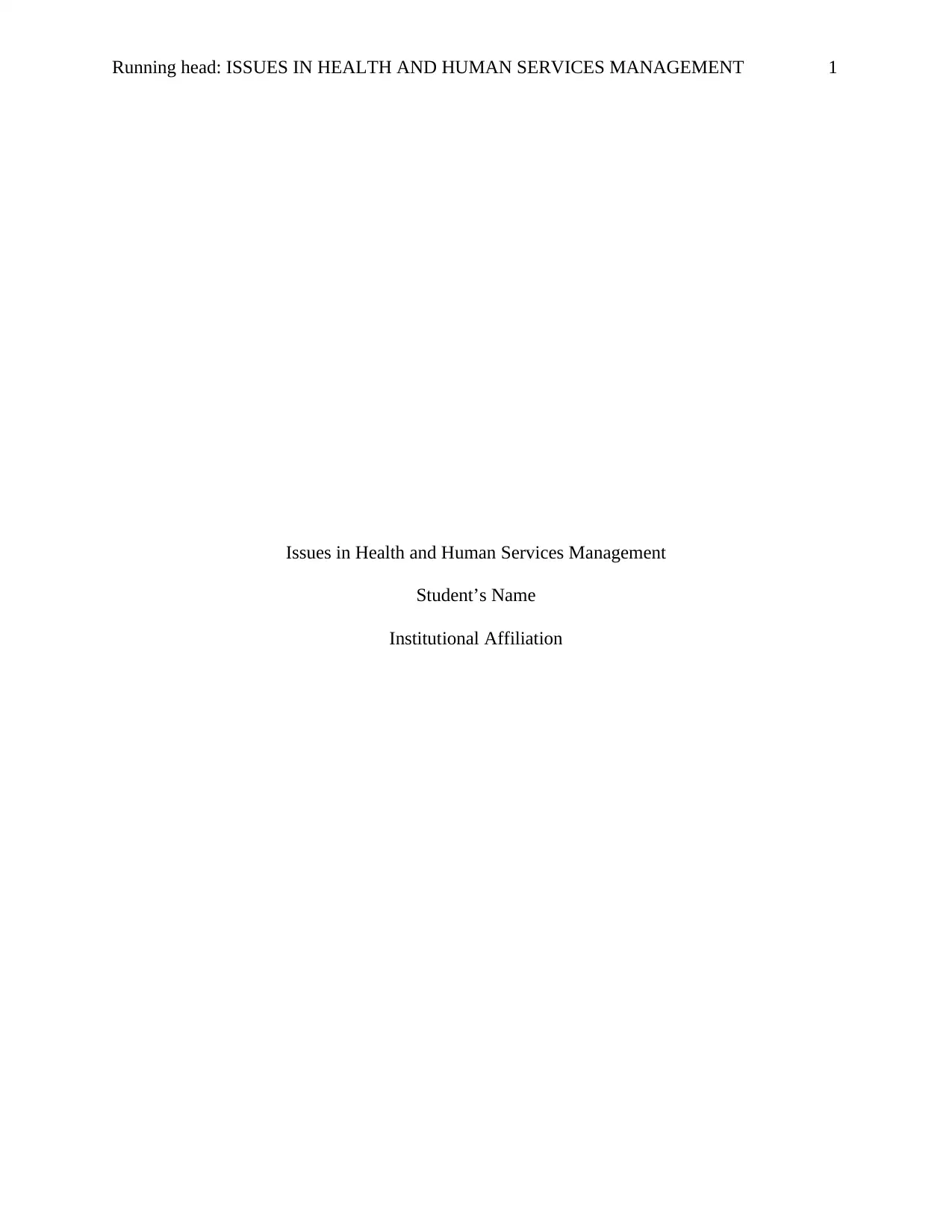
Running head: ISSUES IN HEALTH AND HUMAN SERVICES MANAGEMENT 1
Issues in Health and Human Services Management
Student’s Name
Institutional Affiliation
Issues in Health and Human Services Management
Student’s Name
Institutional Affiliation
Paraphrase This Document
Need a fresh take? Get an instant paraphrase of this document with our AI Paraphraser
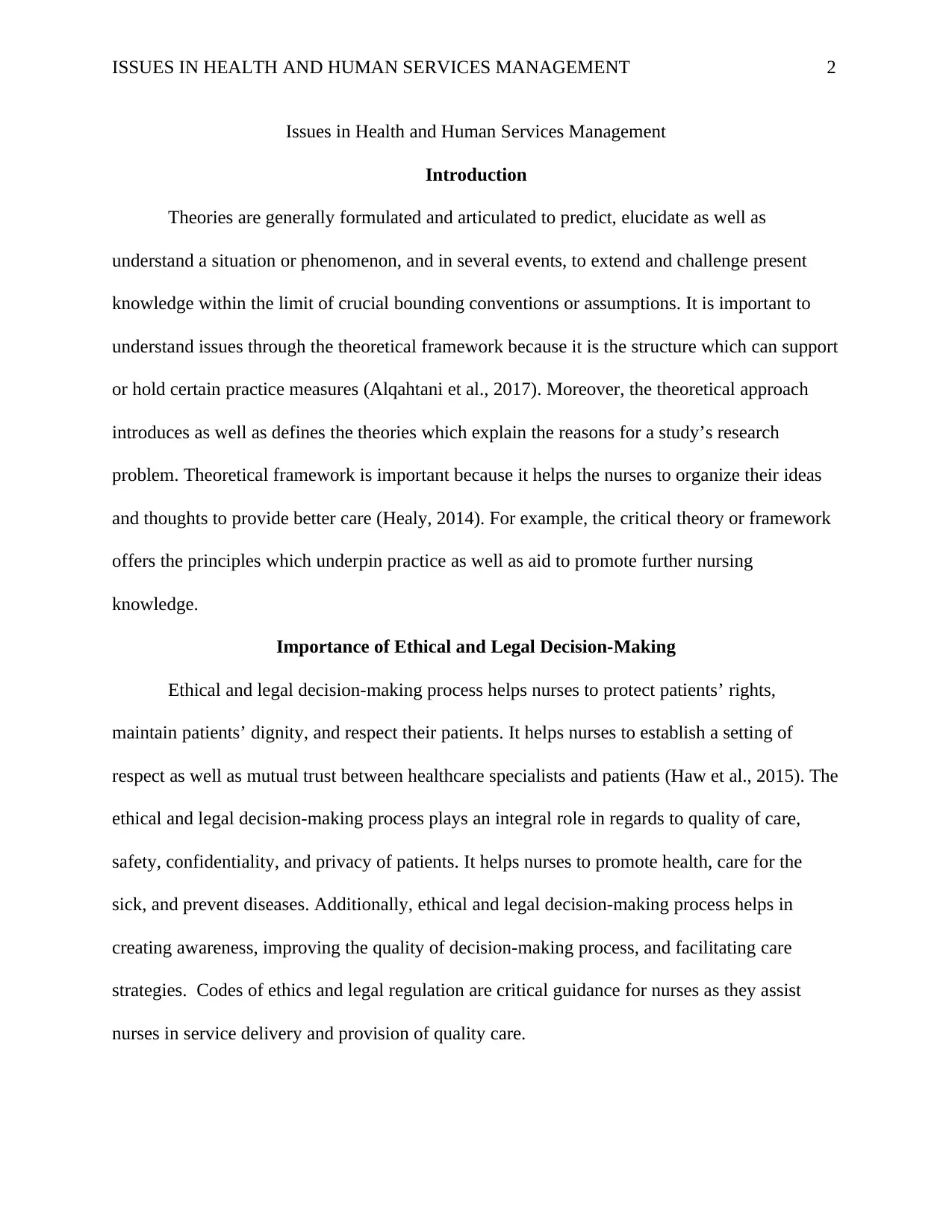
ISSUES IN HEALTH AND HUMAN SERVICES MANAGEMENT 2
Issues in Health and Human Services Management
Introduction
Theories are generally formulated and articulated to predict, elucidate as well as
understand a situation or phenomenon, and in several events, to extend and challenge present
knowledge within the limit of crucial bounding conventions or assumptions. It is important to
understand issues through the theoretical framework because it is the structure which can support
or hold certain practice measures (Alqahtani et al., 2017). Moreover, the theoretical approach
introduces as well as defines the theories which explain the reasons for a study’s research
problem. Theoretical framework is important because it helps the nurses to organize their ideas
and thoughts to provide better care (Healy, 2014). For example, the critical theory or framework
offers the principles which underpin practice as well as aid to promote further nursing
knowledge.
Importance of Ethical and Legal Decision-Making
Ethical and legal decision-making process helps nurses to protect patients’ rights,
maintain patients’ dignity, and respect their patients. It helps nurses to establish a setting of
respect as well as mutual trust between healthcare specialists and patients (Haw et al., 2015). The
ethical and legal decision-making process plays an integral role in regards to quality of care,
safety, confidentiality, and privacy of patients. It helps nurses to promote health, care for the
sick, and prevent diseases. Additionally, ethical and legal decision-making process helps in
creating awareness, improving the quality of decision-making process, and facilitating care
strategies. Codes of ethics and legal regulation are critical guidance for nurses as they assist
nurses in service delivery and provision of quality care.
Issues in Health and Human Services Management
Introduction
Theories are generally formulated and articulated to predict, elucidate as well as
understand a situation or phenomenon, and in several events, to extend and challenge present
knowledge within the limit of crucial bounding conventions or assumptions. It is important to
understand issues through the theoretical framework because it is the structure which can support
or hold certain practice measures (Alqahtani et al., 2017). Moreover, the theoretical approach
introduces as well as defines the theories which explain the reasons for a study’s research
problem. Theoretical framework is important because it helps the nurses to organize their ideas
and thoughts to provide better care (Healy, 2014). For example, the critical theory or framework
offers the principles which underpin practice as well as aid to promote further nursing
knowledge.
Importance of Ethical and Legal Decision-Making
Ethical and legal decision-making process helps nurses to protect patients’ rights,
maintain patients’ dignity, and respect their patients. It helps nurses to establish a setting of
respect as well as mutual trust between healthcare specialists and patients (Haw et al., 2015). The
ethical and legal decision-making process plays an integral role in regards to quality of care,
safety, confidentiality, and privacy of patients. It helps nurses to promote health, care for the
sick, and prevent diseases. Additionally, ethical and legal decision-making process helps in
creating awareness, improving the quality of decision-making process, and facilitating care
strategies. Codes of ethics and legal regulation are critical guidance for nurses as they assist
nurses in service delivery and provision of quality care.
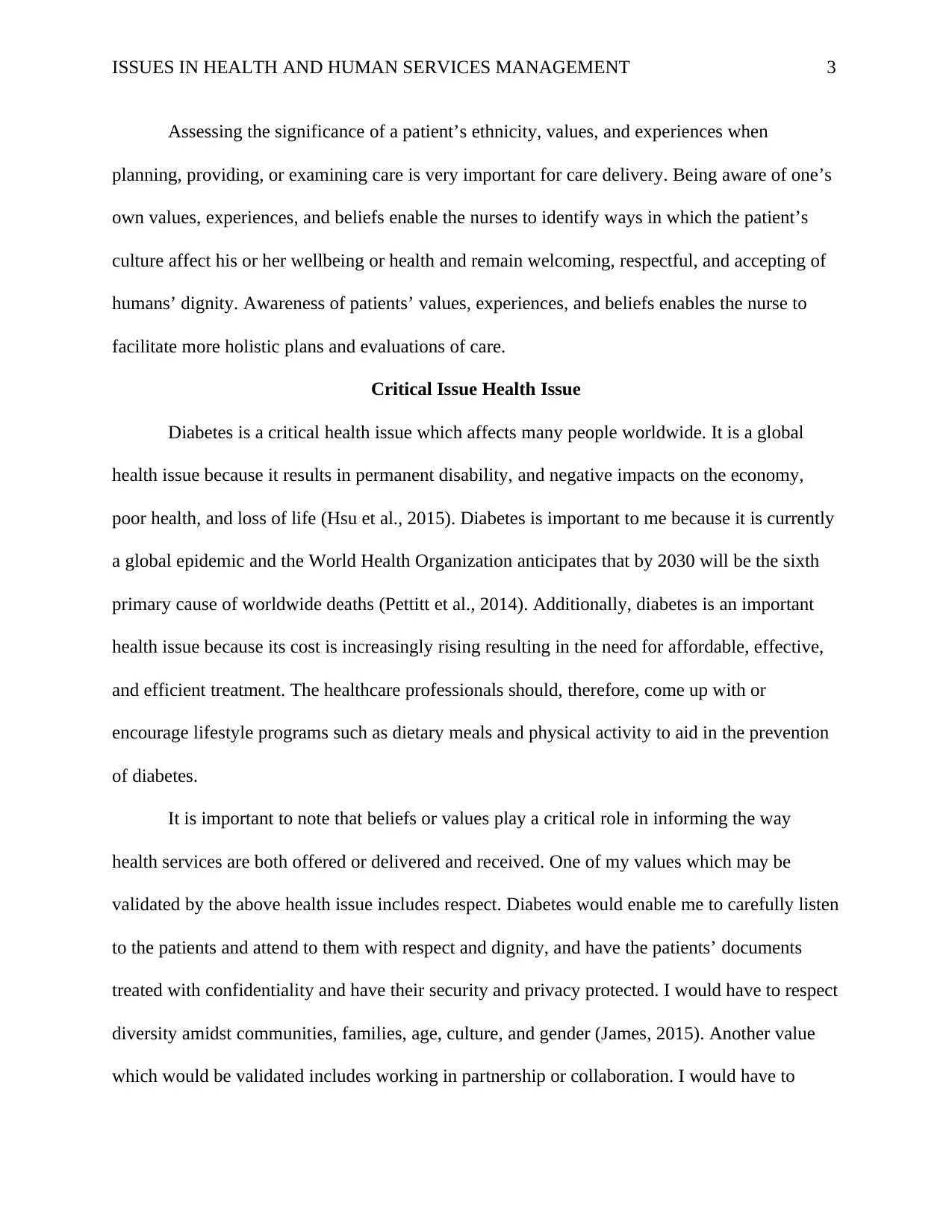
ISSUES IN HEALTH AND HUMAN SERVICES MANAGEMENT 3
Assessing the significance of a patient’s ethnicity, values, and experiences when
planning, providing, or examining care is very important for care delivery. Being aware of one’s
own values, experiences, and beliefs enable the nurses to identify ways in which the patient’s
culture affect his or her wellbeing or health and remain welcoming, respectful, and accepting of
humans’ dignity. Awareness of patients’ values, experiences, and beliefs enables the nurse to
facilitate more holistic plans and evaluations of care.
Critical Issue Health Issue
Diabetes is a critical health issue which affects many people worldwide. It is a global
health issue because it results in permanent disability, and negative impacts on the economy,
poor health, and loss of life (Hsu et al., 2015). Diabetes is important to me because it is currently
a global epidemic and the World Health Organization anticipates that by 2030 will be the sixth
primary cause of worldwide deaths (Pettitt et al., 2014). Additionally, diabetes is an important
health issue because its cost is increasingly rising resulting in the need for affordable, effective,
and efficient treatment. The healthcare professionals should, therefore, come up with or
encourage lifestyle programs such as dietary meals and physical activity to aid in the prevention
of diabetes.
It is important to note that beliefs or values play a critical role in informing the way
health services are both offered or delivered and received. One of my values which may be
validated by the above health issue includes respect. Diabetes would enable me to carefully listen
to the patients and attend to them with respect and dignity, and have the patients’ documents
treated with confidentiality and have their security and privacy protected. I would have to respect
diversity amidst communities, families, age, culture, and gender (James, 2015). Another value
which would be validated includes working in partnership or collaboration. I would have to
Assessing the significance of a patient’s ethnicity, values, and experiences when
planning, providing, or examining care is very important for care delivery. Being aware of one’s
own values, experiences, and beliefs enable the nurses to identify ways in which the patient’s
culture affect his or her wellbeing or health and remain welcoming, respectful, and accepting of
humans’ dignity. Awareness of patients’ values, experiences, and beliefs enables the nurse to
facilitate more holistic plans and evaluations of care.
Critical Issue Health Issue
Diabetes is a critical health issue which affects many people worldwide. It is a global
health issue because it results in permanent disability, and negative impacts on the economy,
poor health, and loss of life (Hsu et al., 2015). Diabetes is important to me because it is currently
a global epidemic and the World Health Organization anticipates that by 2030 will be the sixth
primary cause of worldwide deaths (Pettitt et al., 2014). Additionally, diabetes is an important
health issue because its cost is increasingly rising resulting in the need for affordable, effective,
and efficient treatment. The healthcare professionals should, therefore, come up with or
encourage lifestyle programs such as dietary meals and physical activity to aid in the prevention
of diabetes.
It is important to note that beliefs or values play a critical role in informing the way
health services are both offered or delivered and received. One of my values which may be
validated by the above health issue includes respect. Diabetes would enable me to carefully listen
to the patients and attend to them with respect and dignity, and have the patients’ documents
treated with confidentiality and have their security and privacy protected. I would have to respect
diversity amidst communities, families, age, culture, and gender (James, 2015). Another value
which would be validated includes working in partnership or collaboration. I would have to
⊘ This is a preview!⊘
Do you want full access?
Subscribe today to unlock all pages.

Trusted by 1+ million students worldwide
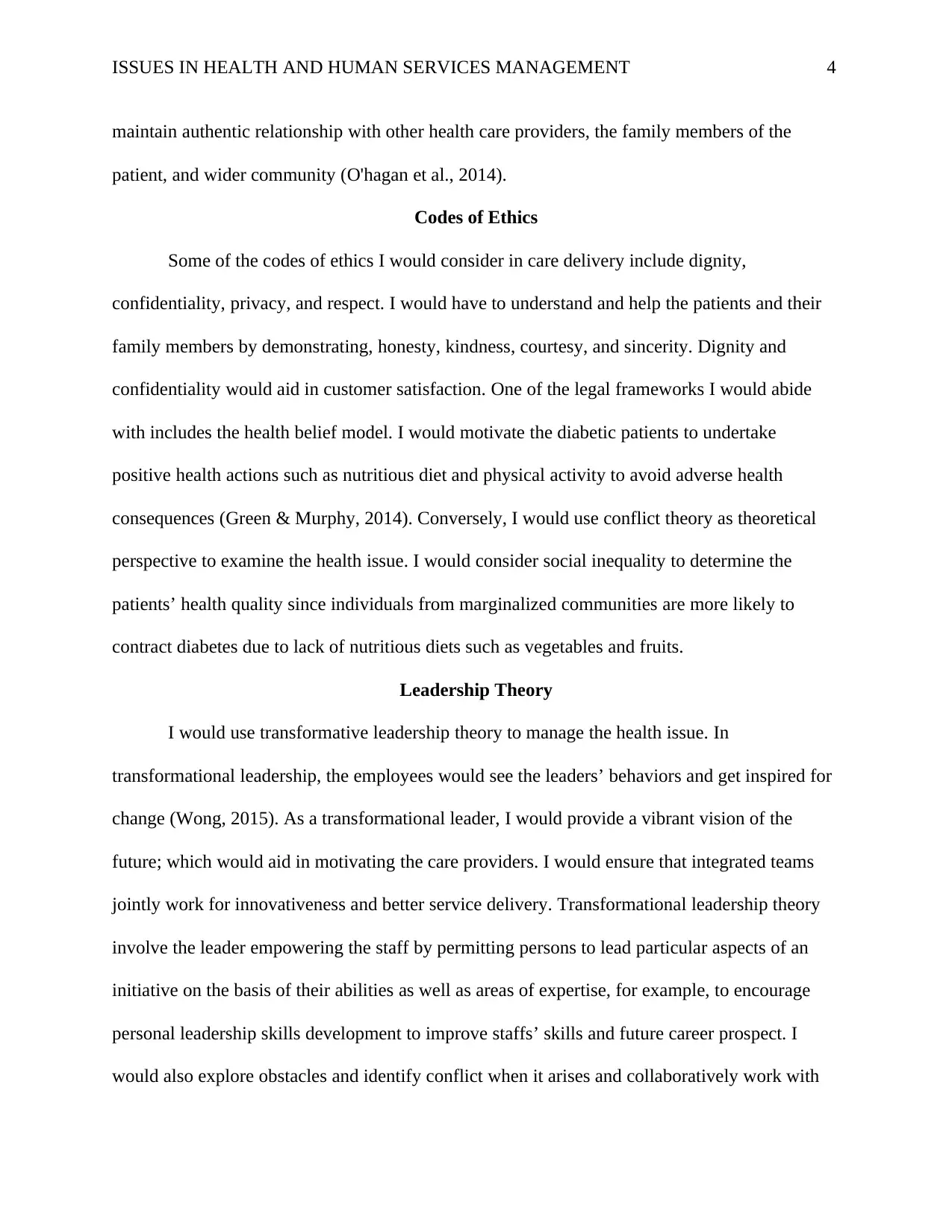
ISSUES IN HEALTH AND HUMAN SERVICES MANAGEMENT 4
maintain authentic relationship with other health care providers, the family members of the
patient, and wider community (O'hagan et al., 2014).
Codes of Ethics
Some of the codes of ethics I would consider in care delivery include dignity,
confidentiality, privacy, and respect. I would have to understand and help the patients and their
family members by demonstrating, honesty, kindness, courtesy, and sincerity. Dignity and
confidentiality would aid in customer satisfaction. One of the legal frameworks I would abide
with includes the health belief model. I would motivate the diabetic patients to undertake
positive health actions such as nutritious diet and physical activity to avoid adverse health
consequences (Green & Murphy, 2014). Conversely, I would use conflict theory as theoretical
perspective to examine the health issue. I would consider social inequality to determine the
patients’ health quality since individuals from marginalized communities are more likely to
contract diabetes due to lack of nutritious diets such as vegetables and fruits.
Leadership Theory
I would use transformative leadership theory to manage the health issue. In
transformational leadership, the employees would see the leaders’ behaviors and get inspired for
change (Wong, 2015). As a transformational leader, I would provide a vibrant vision of the
future; which would aid in motivating the care providers. I would ensure that integrated teams
jointly work for innovativeness and better service delivery. Transformational leadership theory
involve the leader empowering the staff by permitting persons to lead particular aspects of an
initiative on the basis of their abilities as well as areas of expertise, for example, to encourage
personal leadership skills development to improve staffs’ skills and future career prospect. I
would also explore obstacles and identify conflict when it arises and collaboratively work with
maintain authentic relationship with other health care providers, the family members of the
patient, and wider community (O'hagan et al., 2014).
Codes of Ethics
Some of the codes of ethics I would consider in care delivery include dignity,
confidentiality, privacy, and respect. I would have to understand and help the patients and their
family members by demonstrating, honesty, kindness, courtesy, and sincerity. Dignity and
confidentiality would aid in customer satisfaction. One of the legal frameworks I would abide
with includes the health belief model. I would motivate the diabetic patients to undertake
positive health actions such as nutritious diet and physical activity to avoid adverse health
consequences (Green & Murphy, 2014). Conversely, I would use conflict theory as theoretical
perspective to examine the health issue. I would consider social inequality to determine the
patients’ health quality since individuals from marginalized communities are more likely to
contract diabetes due to lack of nutritious diets such as vegetables and fruits.
Leadership Theory
I would use transformative leadership theory to manage the health issue. In
transformational leadership, the employees would see the leaders’ behaviors and get inspired for
change (Wong, 2015). As a transformational leader, I would provide a vibrant vision of the
future; which would aid in motivating the care providers. I would ensure that integrated teams
jointly work for innovativeness and better service delivery. Transformational leadership theory
involve the leader empowering the staff by permitting persons to lead particular aspects of an
initiative on the basis of their abilities as well as areas of expertise, for example, to encourage
personal leadership skills development to improve staffs’ skills and future career prospect. I
would also explore obstacles and identify conflict when it arises and collaboratively work with
Paraphrase This Document
Need a fresh take? Get an instant paraphrase of this document with our AI Paraphraser
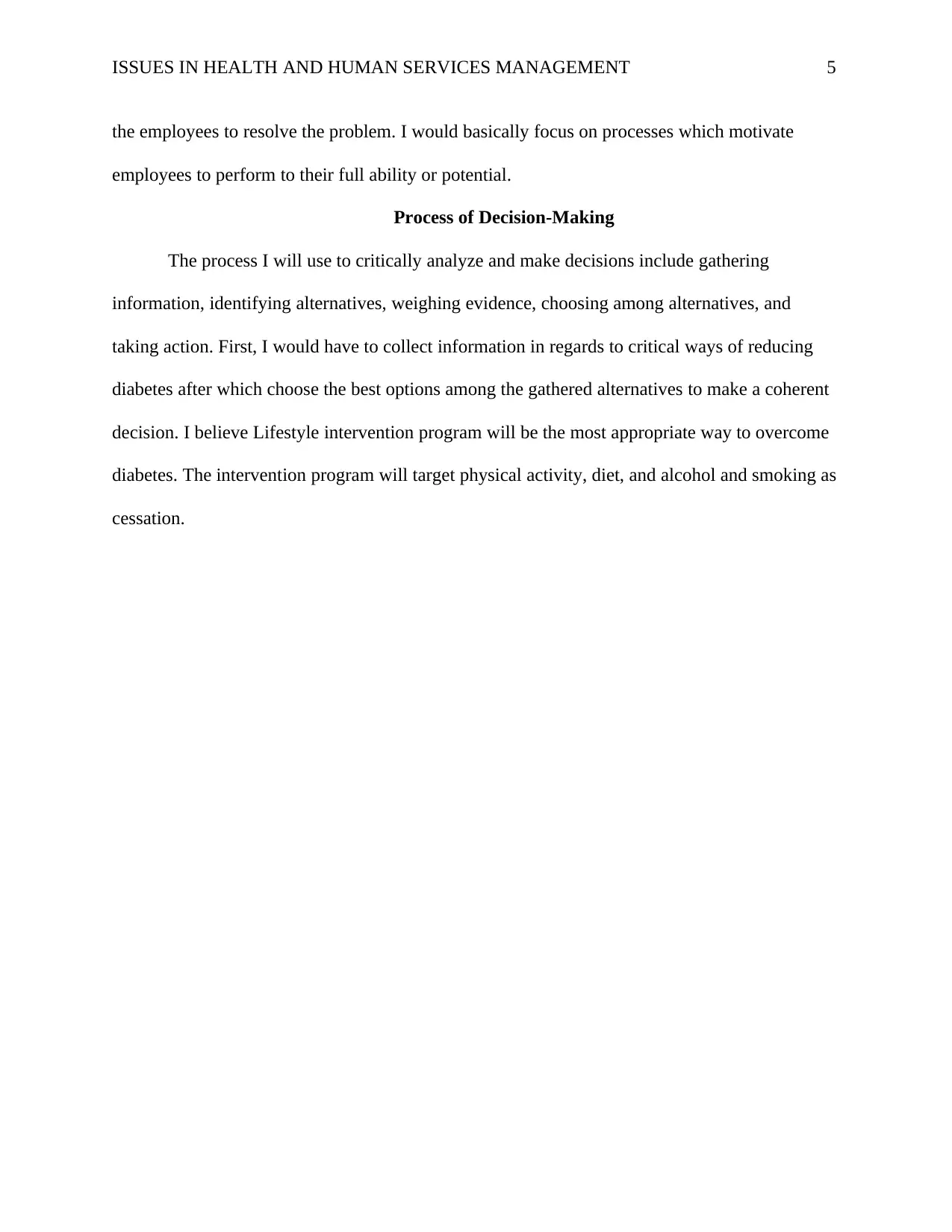
ISSUES IN HEALTH AND HUMAN SERVICES MANAGEMENT 5
the employees to resolve the problem. I would basically focus on processes which motivate
employees to perform to their full ability or potential.
Process of Decision-Making
The process I will use to critically analyze and make decisions include gathering
information, identifying alternatives, weighing evidence, choosing among alternatives, and
taking action. First, I would have to collect information in regards to critical ways of reducing
diabetes after which choose the best options among the gathered alternatives to make a coherent
decision. I believe Lifestyle intervention program will be the most appropriate way to overcome
diabetes. The intervention program will target physical activity, diet, and alcohol and smoking as
cessation.
the employees to resolve the problem. I would basically focus on processes which motivate
employees to perform to their full ability or potential.
Process of Decision-Making
The process I will use to critically analyze and make decisions include gathering
information, identifying alternatives, weighing evidence, choosing among alternatives, and
taking action. First, I would have to collect information in regards to critical ways of reducing
diabetes after which choose the best options among the gathered alternatives to make a coherent
decision. I believe Lifestyle intervention program will be the most appropriate way to overcome
diabetes. The intervention program will target physical activity, diet, and alcohol and smoking as
cessation.
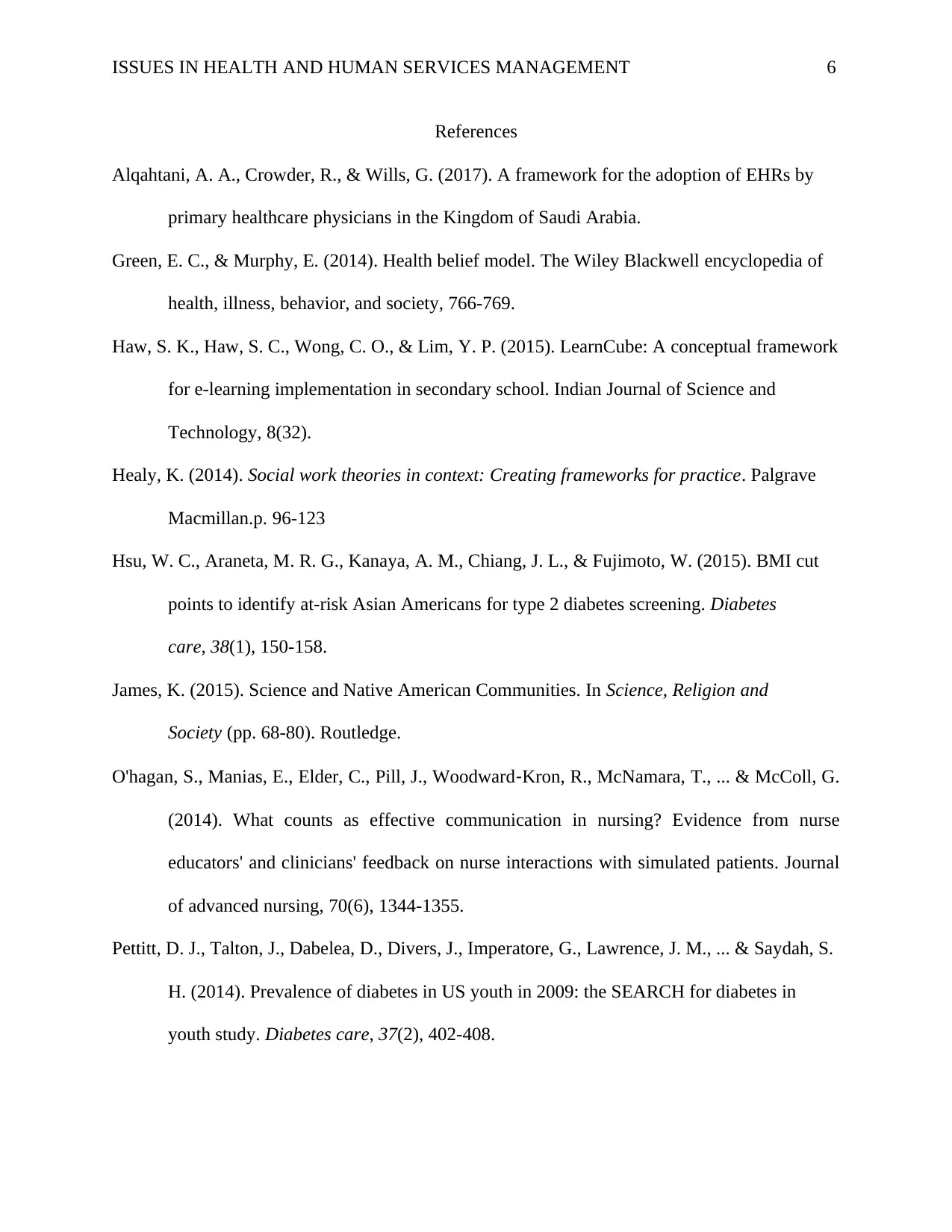
ISSUES IN HEALTH AND HUMAN SERVICES MANAGEMENT 6
References
Alqahtani, A. A., Crowder, R., & Wills, G. (2017). A framework for the adoption of EHRs by
primary healthcare physicians in the Kingdom of Saudi Arabia.
Green, E. C., & Murphy, E. (2014). Health belief model. The Wiley Blackwell encyclopedia of
health, illness, behavior, and society, 766-769.
Haw, S. K., Haw, S. C., Wong, C. O., & Lim, Y. P. (2015). LearnCube: A conceptual framework
for e-learning implementation in secondary school. Indian Journal of Science and
Technology, 8(32).
Healy, K. (2014). Social work theories in context: Creating frameworks for practice. Palgrave
Macmillan.p. 96-123
Hsu, W. C., Araneta, M. R. G., Kanaya, A. M., Chiang, J. L., & Fujimoto, W. (2015). BMI cut
points to identify at-risk Asian Americans for type 2 diabetes screening. Diabetes
care, 38(1), 150-158.
James, K. (2015). Science and Native American Communities. In Science, Religion and
Society (pp. 68-80). Routledge.
O'hagan, S., Manias, E., Elder, C., Pill, J., Woodward‐Kron, R., McNamara, T., ... & McColl, G.
(2014). What counts as effective communication in nursing? Evidence from nurse
educators' and clinicians' feedback on nurse interactions with simulated patients. Journal
of advanced nursing, 70(6), 1344-1355.
Pettitt, D. J., Talton, J., Dabelea, D., Divers, J., Imperatore, G., Lawrence, J. M., ... & Saydah, S.
H. (2014). Prevalence of diabetes in US youth in 2009: the SEARCH for diabetes in
youth study. Diabetes care, 37(2), 402-408.
References
Alqahtani, A. A., Crowder, R., & Wills, G. (2017). A framework for the adoption of EHRs by
primary healthcare physicians in the Kingdom of Saudi Arabia.
Green, E. C., & Murphy, E. (2014). Health belief model. The Wiley Blackwell encyclopedia of
health, illness, behavior, and society, 766-769.
Haw, S. K., Haw, S. C., Wong, C. O., & Lim, Y. P. (2015). LearnCube: A conceptual framework
for e-learning implementation in secondary school. Indian Journal of Science and
Technology, 8(32).
Healy, K. (2014). Social work theories in context: Creating frameworks for practice. Palgrave
Macmillan.p. 96-123
Hsu, W. C., Araneta, M. R. G., Kanaya, A. M., Chiang, J. L., & Fujimoto, W. (2015). BMI cut
points to identify at-risk Asian Americans for type 2 diabetes screening. Diabetes
care, 38(1), 150-158.
James, K. (2015). Science and Native American Communities. In Science, Religion and
Society (pp. 68-80). Routledge.
O'hagan, S., Manias, E., Elder, C., Pill, J., Woodward‐Kron, R., McNamara, T., ... & McColl, G.
(2014). What counts as effective communication in nursing? Evidence from nurse
educators' and clinicians' feedback on nurse interactions with simulated patients. Journal
of advanced nursing, 70(6), 1344-1355.
Pettitt, D. J., Talton, J., Dabelea, D., Divers, J., Imperatore, G., Lawrence, J. M., ... & Saydah, S.
H. (2014). Prevalence of diabetes in US youth in 2009: the SEARCH for diabetes in
youth study. Diabetes care, 37(2), 402-408.
⊘ This is a preview!⊘
Do you want full access?
Subscribe today to unlock all pages.

Trusted by 1+ million students worldwide
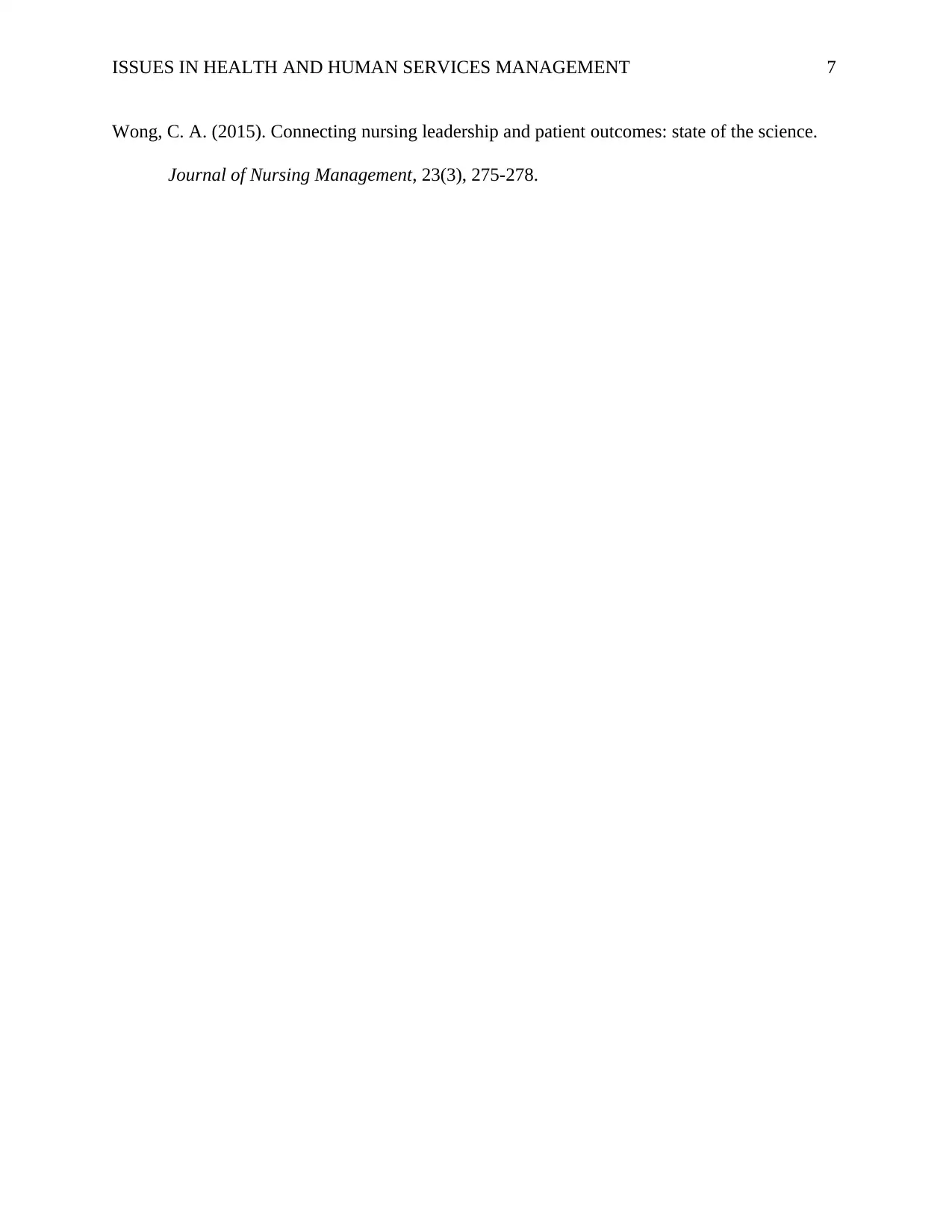
ISSUES IN HEALTH AND HUMAN SERVICES MANAGEMENT 7
Wong, C. A. (2015). Connecting nursing leadership and patient outcomes: state of the science.
Journal of Nursing Management, 23(3), 275-278.
Wong, C. A. (2015). Connecting nursing leadership and patient outcomes: state of the science.
Journal of Nursing Management, 23(3), 275-278.
1 out of 7
Related Documents
Your All-in-One AI-Powered Toolkit for Academic Success.
+13062052269
info@desklib.com
Available 24*7 on WhatsApp / Email
![[object Object]](/_next/static/media/star-bottom.7253800d.svg)
Unlock your academic potential
Copyright © 2020–2026 A2Z Services. All Rights Reserved. Developed and managed by ZUCOL.





